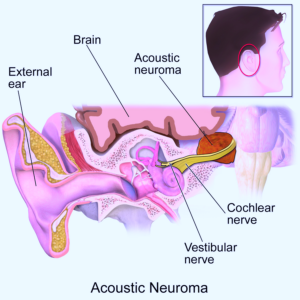An acoustic neuroma is a brain tumor that grows slowly and can cause a variety of symptoms that usually correspond to its size: small or large, or somewhere in between.
And that’s usually. Not always.
“The variability in presenting symptoms for an acoustic neuroma can be surprising,” says Ted McRackan, MD, MSCR, Director, Skull Base Center; Assistant Professor, Department of Otolaryngology – Head and Neck Surgery, Medical University of South Carolina.
“I have had patients with very large tumors with normal hearing and only mild balance complaints, and patients with smaller tumors with no hearing and severe imbalance,” explains Dr. McRackan.
A paper in The Laryngoscope (Volume 103, Issue 3) states: Emphasis is placed on the fact that even a small tumor has the potential to produce sudden hearing loss.
Dr. McRackan continues, “I would say, however, that larger tumors tend to have worse hearing and more balance complaints as opposed to smaller tumors.
“If the tumor becomes very large, patients can have decreased sensation of the face, difficulty walking, be lethargic and occasionally have facial weakness.”
More than Just Hearing and Balance
The shape and location of this benign brain tumor can influence the type of symptoms.
For instance, a small acoustic neuroma that’s pressing against the facial nerve is more likely to cause numbness or weakness in the face than is a big tumor that, just by chance of its location and shape, is not pressing on any nerves.
The direction of its proliferation is another influencer of the type of symptoms.
If the mass begins encroaching upon the brainstem, this can result in hydrocephalus or a disturbance in heart rhythm.
An even larger tumor, however, that’s located away from the brainstem won’t necessarily be pressing into it, and hence, won’t cause those two symptoms.
The symptoms of hearing loss, tinnitus (subjective hearing of sound in an ear) and balance problems are commonly reported.
But an acoustic neuroma – whether small, medium or large – can cause so many more symptoms.
• Clogged feeling in one ear
• Dizziness
• Headache
• Facial weakness, paralysis or pain
• Vision problems
• Swallowing and speech difficulties
Size Categories of Acoustic Neuroma
• Small is under 1.5 cm.
• Medium is 1.5 to 2.5 cm.
• Large is more than 2.5 cm.
Update: Study Compares Watchful Waiting vs. Gamma Knife for Small Symptom-Free Acoustic Neuromas
People with a smaller acoustic neuroma have been typically observed rather than proactively treated; risks of early intervention have historically been thought to outweigh benefits.
An international study, led by UVA Health physicians and published in Neurosurgery (January 2025) shows otherwise.
The findings of neurosurgeon Jason Sheehan, MD, and his team, show that stereotactic radiosurgery (Gamma Knife) can prevent small tumors from enlarging over time, sparing patients from potentially irreversible problems in the future that can result from “watch and wait.”
Dr. Sheehan and his team performed a trial via the International Radiosurgery Research Foundation: 261 adults who had the smallest category of acoustic neuroma or vestibular schwannoma.
Of the research subjects, 182 received stereotactic radiosurgery and 79 did not.
Those who had the radiosurgery showed consistently better tumor control over time.
In this group, 99% of the masses either remained at the same size, grew only a little (less than 25%) or shrank – at time intervals of three, five and eight years.
Only one participant’s tumor significantly got bigger.
Tumor control was much worse among individuals who didn’t undergo the radiosurgery: 37% grew significantly at the three-year mark, 50% at five years and 67% at eight years.
For these patients who had small acoustic neuromas that normally would’ve only been “watched,” radiosurgery was associated with a 54% reduced rate of tinnitus (“ringing in the ears”), a 51% lower rate of cranial nerve deterioration and 83% lower rate of vestibular dysfunction.
Notably, hearing was preserved similarly in both groups.
Dr. Sheehan says in the paper that acoustic neuroma symptoms are often irreversible as this tumor grows.
The paper says that early action, before symptoms develop, could considerably improve long-term quality of life.
 In addition to acoustic neuroma, Dr. McRackan’s clinical practice focuses on comprehensive management of ear, hearing, balance and skull base disorders. Areas of interest include cochlear implants, facial nerve disorders and tumors, vertigo and endoscopic ear surgery.
In addition to acoustic neuroma, Dr. McRackan’s clinical practice focuses on comprehensive management of ear, hearing, balance and skull base disorders. Areas of interest include cochlear implants, facial nerve disorders and tumors, vertigo and endoscopic ear surgery.
 Lorra Garrick has been covering medical, fitness and cybersecurity topics for many years, having written thousands of articles for print magazines and websites, including as a ghostwriter. She’s also a former ACE-certified personal trainer.
Lorra Garrick has been covering medical, fitness and cybersecurity topics for many years, having written thousands of articles for print magazines and websites, including as a ghostwriter. She’s also a former ACE-certified personal trainer.
.



































